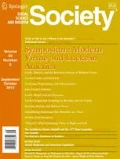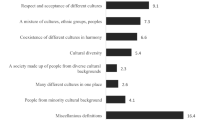Abstract
President Trump’s criticisms of minorities, immigrants, and poor countries, while controversial, point to the need to discuss cultural differences more candidly. Much of the upset over diversity in America and the world results from the fact that everyone is not the same. The United States is the world’s most individualist country, where most people approach life as a quest to achieve their personal goals. But most minority Americans and recent immigrants tend to adjust to the world as it is rather than seeking change. That is a major reason why integration of these groups has proven difficult. Poor countries abroad are often ill-governed because local culture accepts misrule more passively than in the West. The entire American tradition, including political theory and theology, takes an individualist culture as normal and thus fails to address our current challenges. We need a new tradition in which cultural difference is the subject rather than denied.
Similar content being viewed by others
Notes
Richard E. Nisbett, The Geography of Thought: How Asians and Westerners Think Differently . . . and Why (New York: Free Press, 2003).
Quoted in Anthony Lewis, “A New National Scripture,” New York Times Magazine, January 18, 2009, p. 10.
Lawrence M. Mead, “Overselling the Earned Income Tax Credit,” National Affairs, no. 21 (Fall 2014): 20–33.
Lawrence M. Mead, ed., The New Paternalism: Supervisory Approaches to Poverty (Washington, DC: Brookings, 1997).
Charles Murray, Coming Apart: The State of White America, 1960–2010 (New York: Crown Forum, 2012).
Adele Hassan and Audrey Carlsen, “How ‘Crazy Rich’ Asians Have Led to the Largest Income in t he U.S.” New York Times, August 17, 2018.
Francine D. Blau, and Christopher Mackie, eds., The Economic and Fiscal Consequences of Immigration (Washington, DC: National Academies Press, 2017).
Lawrence M. Mead, “Immigration: The Cultural Dimension,” Society 53, no. 2 (March/April 2016): 116–22.
Francis Fukuyama, State-Building: Governance and World Order in the twenty-first Century (Ithaca: Cornell University Press, 2004).
Peter Hessler, “Revolution on Trial,” The New Yorker, March 10, 2014, pp. 26–32.
Nicholas Lemann, The Promised Land: The Great Black Migration and How It Changed America (New York: Knopf, 1991), pp. 6–7, 149, 200.
Hannah Arendt, The Human Condition (Chicago: University of Chicago Press, 1958).
David Goodhart, The Road to Somewhere: The Popular Revolt and the Future of Politics (London: Hurst and Co., 2017).
Lawrence M. Mead, “Moral Overload,” American Affairs 2 (2018).
Author information
Authors and Affiliations
Corresponding author
Rights and permissions
About this article
Cite this article
Mead, L.M. Cultural Difference. Soc 55, 482–487 (2018). https://doi.org/10.1007/s12115-018-0296-0
Published:
Issue Date:
DOI: https://doi.org/10.1007/s12115-018-0296-0




